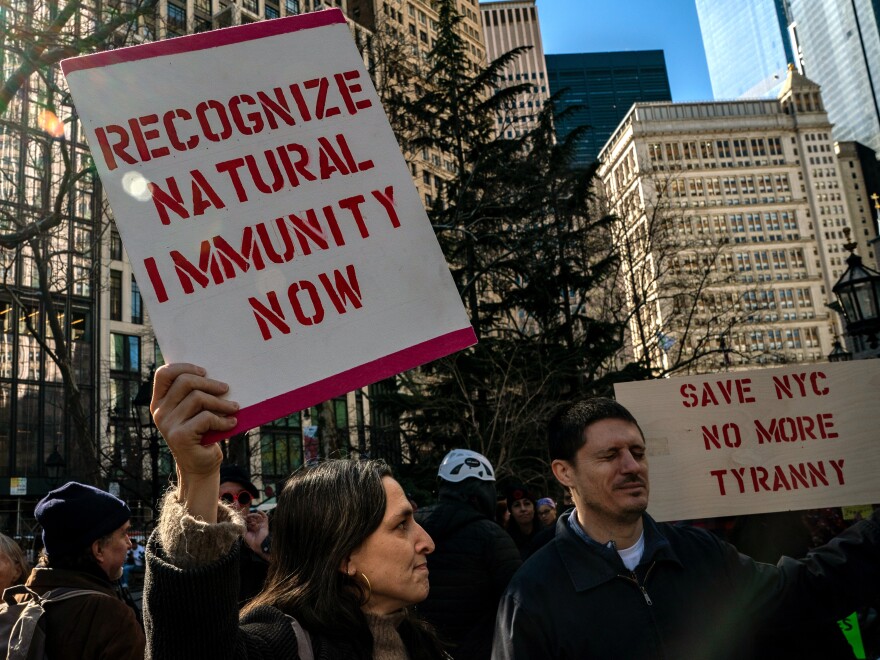For ten years, George Garvey had a routine.
He'd set his alarm for 4:30 a.m., jump in the shower, grab his coffee and be out on the streets of New York City collecting trash at 6 a.m.
Nowadays, he gets up, makes breakfast for his teenagers before school, finds things to do around the house or the yard, and then sits down to work on his lawsuit.
Garvey was one of 16 New York City sanitation workers fired for refusing to get a COVID vaccine, and one of thousands nationwide who chose losing their jobs over getting the shots. It's a group that also includes teachers, coaches, pilots, health care workers and others.
As COVID has evolved into a less deadly disease, many employers have loosened or even dropped their vaccine mandates. But for some workers fired over the rules, the battle against their employers continues in court.
Nearly all workers in New York City faced vaccine mandates
New York City has had some of the strictest and broadest vaccine mandates in the country. By the end of 2021, the city was enforcing rules for both public and private sector workers.
Still, Garvey didn't believe he'd be out of a job — especially a job like his.
"We don't deal with the public at all. We don't respond to 9-1-1 calls. We don't even go on people's property," he says. "Even when it began, I kept thinking to myself, 'There's no way they're really going to fire us.'"
Garvey was distrustful of the vaccines, uncomfortable with how quickly they had been rolled out. Plus, he felt he didn't need a vaccine, because he'd had COVID in March 2020, at the very start of the pandemic.

Faced with the mandate, he filed for a religious exemption, but his request was denied. By January, he was put on unpaid leave, and on February 11, he was terminated.
He didn't go quietly.
Garvey called around to the other Sanitation Department garages, found out who else had been fired, hired a lawyer and sued.
A judge ordered New York City to reinstate workers fired over the mandate, but the city is appealing
On October 24, a New York state judge ruled that the city's vaccine mandate for public employees was arbitrary and capricious, and therefore in violation of the state constitution. He ordered the city to reinstate city employees who'd been fired over the mandate with back pay.
The next day, New York City filed a notice of appeal, indicating its intent to fight the judge's decision. (The city won't comment on the case, other than to say it has no obligation to reinstate workers while the appeal is pending.)
But also on that day, the city went the opposite direction on the vaccine mandate for the private sector. Mayor Eric Adams had already announced his intent to lift the private sector mandate, and on October 25, the city's Board of Health voted unanimously to approve that plan.
Pressed on how he could lift a vaccine mandate for some workers and not others, Mayor Adams struggled to come up with a compelling response.
"I don't think anything dealing with COVID is — makes sense, and there's no logical pathway," he told reporters in September. "You make decisions based on how to keep our city safe, how to keep our employees operating."
Employers have relaxed or lifted vaccine rules as COVID evolves
There's no doubt that COVID vaccines have saved lives. A recent study by the Commonwealth Fund found that widespread vaccination in the U.S. has had the cumulative effect of preventing 18 million additional hospitalizations and 3 million additional deaths.
Still, a couple developments have made it harder to justify keeping unvaccinated workers off the job.
First, Omicron turned out to be less deadly than previous variants. Second, it's now clear that while vaccines reduce the risk of severe illness, they're not that effective at stopping infection or transmission. By the spring of 2022, most Americans — vaccinated or not — had had COVID at least once, according to the CDC.
Earlier this year, employers started adjusting their vaccine policies.
United Airlines still requires employees to be vaccinated, but at the end of March, the airline brought back the couple of thousand unvaccinated workers who'd been put on leave without pay, citing declining case counts and hospitalizations.
More recently, employers including Tyson Foods and Goldman Sachs dropped their vaccine mandates altogether. Congress voted to end the U.S. military's vaccine mandate as part of the National Defense Authorization Act.
Unvaccinated workers had some trouble finding new employment in NYC
In New York City, job hunting was a challenge for unvaccinated workers — for a time.
Kola Smith, who started with the city sanitation department in 2004, found that essentially every job posting listed COVID vaccination as a requirement. That changed on November 1, when the city lifted the private sector mandate.

Smith is now driving a bus at LaGuardia Airport, earning far less than he used to in sanitation. If the court ruling is upheld, and city workers are offered reinstatement, he says he'll definitely go back to his old job.
"I love the men. I love the job. If they call me back, I'm ready to rock and roll," he says.
Garvey is not so sure. After the bitter fight over the last year, he thinks things will never be the same.
"I don't regret what I've done. I don't regret anything that's happened so far," he says as he waits for his case to play out. "Might be a long way. Might be a short way. Might not be exactly what we want, but you know — we've won."
Now he has to wait to see if a higher court agrees.
Copyright 2022 NPR. To see more, visit https://www.npr.org. 9(MDA3OTAzNzgzMDEzMTIyMTYyODIxZDdjYg004))




